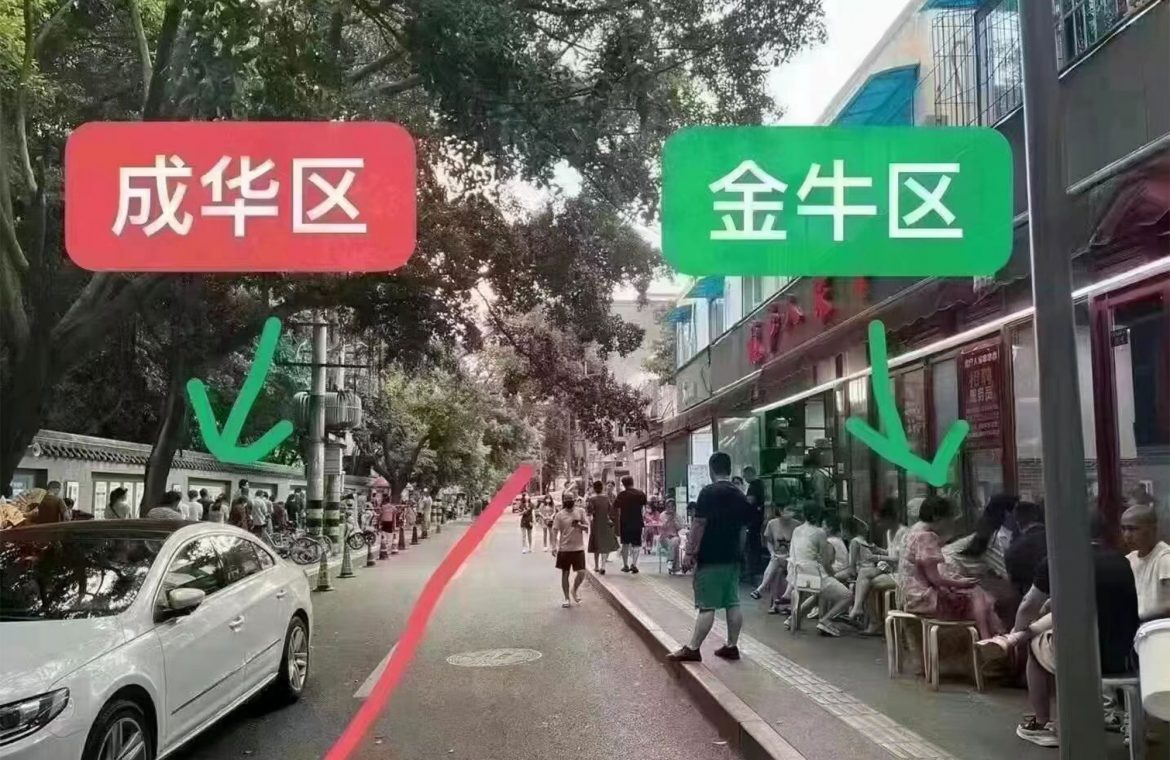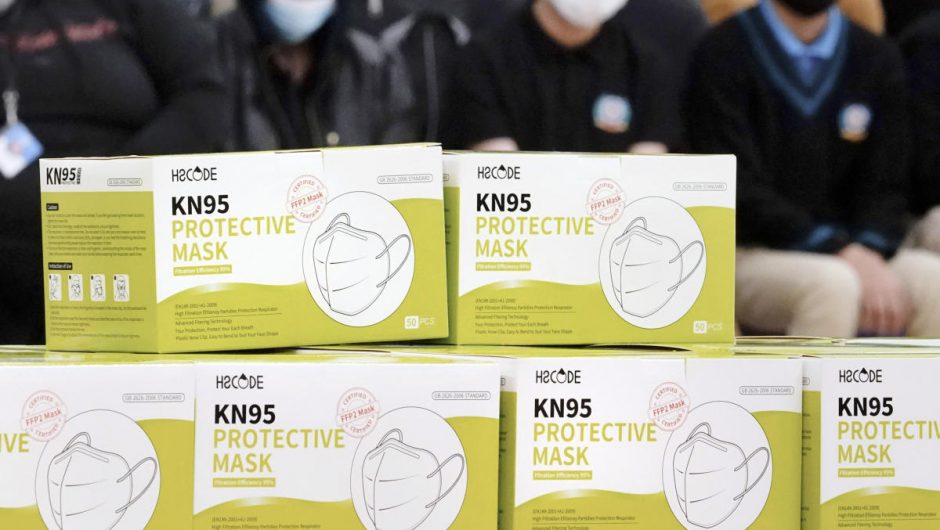[ad_1]
One photo has summed up the mind-boggling difference in Covid rules between two neighboring Chinese districts.
The image, shared on social media by Council on Foreign Relations senior fellow for global health Yanzhong Huang, shows locals on one side of a street lining up for Covid tests, while on the other, diners are enjoying their restaurant meals.
Dr Huang said the photo represented a “tale of two districts in Chengdu, (a city in) Sichuan province”.
“Residents of Chenghua district (left) line up to be tested on Covid, while residents of Jinniu district (right) wait to get a nice meal,” he wrote.
He said the Chenghua district was currently under strict lockdown rules after a concentration of Covid cases in the area.
According to China Daily, food and required services would be delivered to people in residences lining Fuqing Road where positive cases had been detected.
Elsewhere in the district, households can allow one person to leave the home to purchase essential items once a day.
The tight restrictions were expected to last for five days, but city authorities reportedly told locals the measures could be extended.
A woman wearing a face mask reaches through a barricade to receive a delivery package in Shanghai.AP
Vegetables, meat, food staples and other items were being delivered to residents not allowed to leave their home with the help of volunteers and delivery workers.
Another photo shared on Twitter showed locked-up Chenghua residents reaching over a boundary fence with small signs in reported attempts to sell produce.
An incredibly different life is being lived by people separated by one crucial road in China, where strict lockdown rules have been reintroduced.
“Peddlers are trying to sell vegetables outside the lockdown district in China today,” the person who shared the image wrote.
Chenghua falls into a high-risk category, which means people are banned from leaving their homes until the risk level is downgraded to medium.
The risk will only be downgraded when the area remains Covid-free for a week and all residents test negative on a seventh day, Bloomberg reported.
Once there have been no infections for a further three days, the area will be downgraded again to low risk.
A delivery worker gives food to a man during the coronavirus lockdown in the Jing’ an district of Shanghai.AFP via Getty Images
On the Jinniu district side of the street, residents were shown sitting outside restaurants in close proximity with one another.
The stark difference in rules was an example of China’s Covid system working “very well”, chair of skin care and consumer health product company EZZ Life Science, Glenn Cross, said.
“China has introduced comprehensive systems and digital tools to assist people across the community to stay safe and reduce exposure to Covid. They utilise QR codes which provide people with colour-coded information about their exposure,” Mr Cross told news.com.au.
“In this image people on one side of the road are enjoying dining because they have not been exposed to Covid, whereas on the other side, people are queuing up for testing.
“While the image may appear to give a different perspective, it is a safe and highly effective system.”
Mr Cross said the photo displayed how China was “highly organised and efficient”.
“It is a system that is allowing people to continue with life as per normal as much as possible while also ensuring there are systems in place to manage and minimise outbreaks,” he said.
Tight border controls in place
For people who need to leave the city of Chengdu, they must present a negative nucleic acid test result taken within 48 hours, publication Crisis 24 reported. Those in the high-risk Chenghua area must still comply with stay-at-home orders while in place.
Seven days of isolation or centralised quarantine must be completed by people who arrive in Chengdu if they have been in medium and high-risk areas during the previous seven days.
And anyone entering Chengdu from a low-risk area needs to return two negative tests within three days of arriving, while those arriving at Shuangliu International Airport (CTU) and Tianfu International Airport (TFU) have to test negative within 48 hours.
Dr Huang said the photo showing the division of people on the street represented a “tale of two districts in Chengdu, Sichuan province.”Council on Foreign Relations
Face masks are mandatory in crowded areas and on public transport, the publication reported.
Non-essential venues including entertainment and sport establishments are allowed to re-open in low risk areas, with a negative Covid test required within 48 hours to gain entry.
While restaurants are allowed to offer dine-in service, officials have encouraged residents to utilise takeaway and delivery options instead.
Communities deemed high and medium risk are reportedly being monitored by security officers, tasked with policing checkpoints to ensure no illegal movements are undertaken.
Covid-zero policies hurting business
Strict Covid-zero restrictions are also having an impact on China’s economy, with the manufacturing activity dropping in July, according to official data.
The Purchasing Managers’ Index (PMI), a key gauge of manufacturing activity in the world’s second-biggest economy, came in at 49.0 in July, down from 50.2 June and below the 50-point mark separating growth from contraction, National Bureau of Statistics data showed.
A small number of pedestrians prepare to board a plane at Chengdu Shuangliu Airport amid the Covid-19 lockdown.Future Publishing via Getty Imag
While sweeping Covid curbs have eased in major cities such as Shanghai and Beijing, sporadic lockdowns around the country have kept businesses and consumers worried.
“In July, the manufacturing PMI dropped … due to factors such as the traditional off-season for production, insufficient release of market demand and decline in prosperity of high-energy-consuming industries,” NBS senior statistician Zhao Qinghe said in a statement.
Keep up with today’s most important news
Stay up on the very latest with Evening Update.
Mr Zhao added that sharp price fluctuations of raw materials had led some companies to adopt a wait-and-see approach, “weakening purchasing intentions”.
The proportion of firms saying there was insufficient market demand had also increased for four consecutive months, he said, noting this was the “main difficulty” among manufacturers.
But officials show few signs of relaxing strict pandemic curbs, with policymakers appearing to emphasise zero-Covid over growth in a Politburo meeting this week, where they vowed to strive for “the best outcome” rather than to meet economic and social targets.
Chinese leaders had originally set a full-year GDP growth target of around 5.5 per cent, but with economic expansion of just 0.4 per cent in the second quarter, analysts believe it is unlikely to hit that goal.
China’s non-manufacturing PMI also dropped in July – to 53.8 points, down from 54.7 in June, NBS data showed.
This follows policies to boost consumption and with a pick-up in construction activities, the NBS statement said.
[ad_2]
Source link




